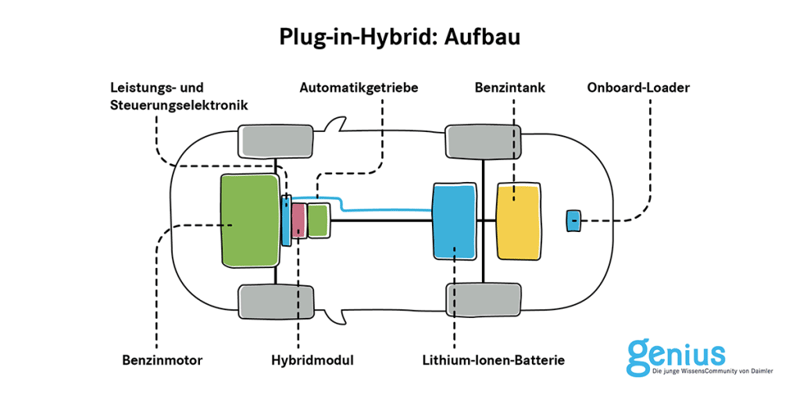12 Questions
Welche Vorteile bieten Hybridmotoren im Vergleich zu herkömmlichen Benzinmotoren?
Reduzierte Emissionen, erhöhte Kraftstoffeffizienz und leisere Betriebsweise
Welche Art von Fahrzeugen profitiert besonders von Hybridmotoren im städtischen Umfeld?
Fahrzeuge für kurze Fahrten in der Stadt
Wie funktionieren Serien-Hybridantriebe im Vergleich zu Parallel-Hybridantrieben?
Die Elektromotoren sind direkt mit den Rädern verbunden in Serien-Hybridantrieben, während sie in Parallel-Hybridantrieben über separate Wellen an die Räder angeschlossen sind.
Was sind die Nachteile von Hybridmotoren im Vergleich zu herkömmlichen Benzinmotoren?
Höhere Anschaffungskosten und schwierigere Wartung
Wofür sind Serien-Hybridantriebe hauptsächlich bekannt?
Für die direkte Verbindung zwischen Elektromotor und Rädern
Welche Vorteile bieten Parallel-Hybridantriebe im Vergleich zu Serien-Hybridantrieben?
Nahtloses Umschalten zwischen Elektro- und Benzinbetrieb
Was ist ein Nachteil von Hybridmotoren?
Komplexe Baukomponenten
Wie funktioniert der elektrische Motor in einem Hybridmotor während Beschleunigung und langsamer Fahrt?
Der elektrische Motor treibt das Fahrzeug hauptsächlich an
Welchen Vorteil bieten Hybridmotoren im Hinblick auf Kraftstoffeffizienz?
Erhebliche Kraftstoffeinsparungen
Warum sind Hybridmotoren in Bezug auf Umweltverschmutzung vorteilhaft?
Niedrige Emissionen
Was ist eine der Hauptursachen für die hohen Kosten von Hybridmotoren?
Spezialisierte Wartungs- und Reparaturdienste
Wann übernimmt der Verbrennungsmotor die Antriebsarbeit in einem Hybridfahrzeug?
Bei höheren Geschwindigkeiten und zusätzlicher Leistung
Study Notes
Hybrid Engines
Hybrid engines represent a significant advancement in the automotive industry, offering a more sustainable alternative to traditional gasoline engines. These powertrains combine the efficiency of electric motors with the versatility of internal combustion engines, resulting in vehicles with reduced emissions, increased fuel economy, and quieter operation. In this article, we will delve into the various aspects of hybrid engines, including their applications, types, working principles, disadvantages, and advantages.
Applications
Hybrid engines find application in various types of vehicles, including cars, buses, and even heavy-duty trucks. These engines are particularly beneficial for short-trip driving, where they can operate primarily on electric power, such as in urban environments. They also provide a viable solution for fleets seeking to reduce emissions while maintaining performance.
Types
There are two main types of hybrid engines: Series Hybrid and Parallel Hybrid. In Series Hybrid systems, the electric motor drives the wheels directly, and the gasoline engine acts as a generator to charge the battery. This configuration is commonly found in electric buses and allows the vehicle to operate solely on battery power. Parallel Hybrid systems, on the other hand, have both the electric motor and the internal combustion engine connected to the wheels via different shafts. This configuration allows for seamless switching between electric and gasoline power.
Working Principle
The working principle of hybrid engines involves the integration of an electric motor with an internal combustion engine. The electric motor can either operate independently to drive the vehicle, or it can work in conjunction with the internal combustion engine to improve overall performance and reduce exhaust emissions. When accelerating from rest or during low speed driving, the electric motor provides most of the propulsion, while the internal combustion engine takes over when higher speeds and additional power are required.
Disadvantages
Despite their numerous benefits, hybrid engines come with some drawbacks. One major disadvantage is their high cost due to the complex components involved in their construction. Additionally, they require specialized maintenance and repair services, which can be expensive and difficult to find. Another limitation is their limited range compared to conventional vehicles, making them less suitable for longer trips or extended travel periods.
Advantages
However, hybrid engines offer several advantages as well. They produce significantly lower emissions than traditional gasoline engines, contributing to better air quality and environmental sustainability. Furthermore, because hybrid engines rely heavily on electric power for propulsion, they generally achieve much higher fuel efficiency, leading to significant savings in fuel costs over time. Lastly, hybrid engines produce minimal noise pollution, providing a quieter and more comfortable driving experience.
In conclusion, hybrid engines represent a promising development in the field of transportation technology. Offering a balance between efficient, clean energy and the adaptability of traditional internal combustion engines, these advanced powertrains are poised to play a crucial role in our transition towards more sustainable mobility solutions.
Explore the world of hybrid motors and learn about their applications, types, working principles, advantages, and disadvantages. Discover how these innovative powertrains combine electric motors with internal combustion engines for reduced emissions, increased fuel economy, and quieter operation.
Make Your Own Quizzes and Flashcards
Convert your notes into interactive study material.
Get started for free



